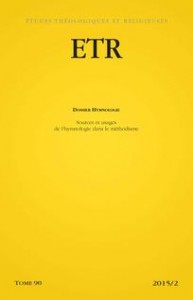La pensée de Luther est inséparable de sa vie. Son œuvre de réformateur de l’Église s’enracine dans son épreuve personnelle d’une reformation de la subjectivité croyante par l’Évangile compris comme événement de parole réalisant la justification de l’être humain devant Dieu sola fide. Choisissant une perspective systématique, Guilhen ANTIER propose d’effectuer une plongée au cœur de l’expérience spirituelle de Luther pour montrer en quoi et comment cette expérience provoque un changement de paradigme qui ouvre à une reconfiguration du discours théologique. Dans l’horizon du jubilé de la Réformation en 2017, les notions fondamentales de la théologie luthérienne telles que justice, foi, péché, conscience et œuvre sont ici explicitées et redéployées pour en saisir la cohérence et la pertinence.
Luther’s thought is deeply related to his life. His work as a Reformer of the Church has its roots in his personal experience of the Gospel reforming the subjectivity of the believer to be understood as a word-related event realizing the justification of the human being in front of God sola fide. Written from a systematic point of view, this article proposes to dive into the heart of Luther’s spiritual experience in order to explain how this experience produces a change of paradigm that leads to a reconfiguration of his theology. Anticipating the jubilee of the Reformation in 2017, the basic concepts of Lutheran theology such as justice, faith, sin, conscience and work are made explicit and redeployed in their coherence and relevance.
p. 181-201
Auteur
ANTIER Guilhen
Guilhen ANTIER, docteur en théologie et en études psychanalytiques, est maître de conférences en théologie systématique à l’Institut protestant de théologie, Faculté de Montpellier, membre du Centre de recherches interdisciplinaires en sciences humaines et sociales (CRISES – EA 4424).
